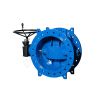What is a Double Eccentric Butterfly Valve used for?
In the vast landscape of industrial valves, the double eccentric butterfly valve stands out as a versatile and efficient component. This engineering marvel finds application in various industries, playing a crucial role in controlling and regulating the flow of fluids. Let's explore the features and applications that make the double eccentric butterfly valve an indispensable tool for fluid management.
Understanding the Double Eccentric Design:
A double eccentric butterfly valve is characterized by its unique design, featuring two offsets: one at the shaft and another at the disc. The term "eccentric" refers to the off-center positioning of these elements. This innovative design imparts distinct advantages, including improved sealing capabilities, reduced friction, and enhanced durability.
Applications in Water Treatment:
One of the primary applications of double eccentric butterfly valves is in water treatment facilities. These valves efficiently control the flow of water in pipelines, ensuring precise regulation and preventing water hammer, a phenomenon that can cause damage to pipes and equipment. The double eccentric design allows for a tight shut-off, reducing the risk of leakage and enhancing the overall efficiency of water treatment processes.
Industrial Process Control:
In industries where precise control over fluid flow is paramount, double eccentric butterfly valves shine. Their ability to modulate flow rates with accuracy makes them ideal for applications such as chemical processing, power generation, and oil and gas refining. The double offset design minimizes wear and tear, contributing to the longevity of the valve in demanding industrial environments.

Fire Protection Systems:
Double flange eccentric butterfly valves play a crucial role in fire protection systems, where reliability and quick response are essential. These valves are often employed to control the flow of water in sprinkler systems and fire hydrants. The swift and precise operation of the double eccentric butterfly valve ensures rapid response times, a critical factor in emergency situations.
High-Pressure Steam Systems:
In steam systems where high pressures and temperatures are commonplace, the double eccentric butterfly valve proves its mettle. The valve's robust construction and sealing capabilities make it suitable for applications involving steam control, ensuring safety and efficiency in power plants and other industrial settings.
Advantages of the Double Eccentric Butterfly Valve:
Reduced Friction and Wear: The double eccentric design minimizes contact between the disc and the valve seat, reducing friction and wear. This feature enhances the valve's lifespan and reduces maintenance requirements.
Tight Shut-Off: The double offset configuration allows the valve to achieve a tight shut-off, preventing leakage and ensuring the efficient control of fluid flow.
Versatility: Double eccentric butterfly valves are adaptable to various media, including water, gases, and corrosive chemicals, making them suitable for a wide range of applications across different industries.
Quick and Precise Operation: The design of these valves enables quick and precise control over fluid flow, a crucial factor in processes where timing is critical.
Conclusion:
The double eccentric butterfly valve stands as a testament to engineering ingenuity, offering a blend of precision, durability, and versatility. From water treatment facilities to industrial processes and fire protection systems, this valve plays a pivotal role in ensuring the seamless and efficient management of fluids. As industries continue to evolve, the double eccentric butterfly valve remains a reliable and indispensable component in the intricate machinery of fluid control and regulation.

Comments
0